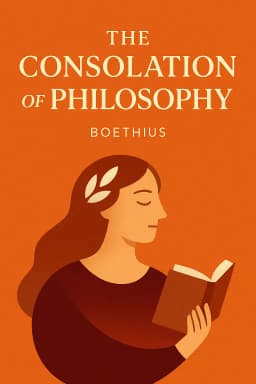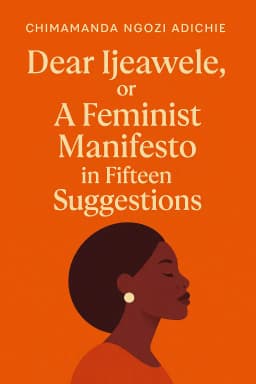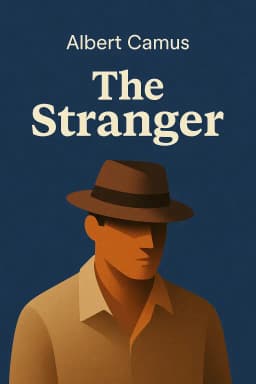
Breaking Up With Lady Fortune
Golden Hook & Introduction
SECTION
Michael: Alright Kevin, pop quiz. A 6th-century Roman senator named Boethius is on death row. What does he write? A tell-all memoir? A desperate plea for his life? Kevin: Easy. He writes the world's first passive-aggressive subtweet to Lady Luck, titled 'It's Not Me, It's You.' Michael: You know, you are shockingly close. The real title is The Consolation of Philosophy, written by a man with the truly epic name of Anicius Manlius Severinus Boethius. Kevin: Wow, that name has more parts than a flat-pack wardrobe. But wait, he really wrote this in prison? Michael: He did. And what's wild is that Boethius wasn't some fringe thinker living in a garret. This man was the equivalent of a top cabinet secretary in the Ostrogothic kingdom of Italy. He was a celebrated scholar, from a noble family, fabulously wealthy. He had it all. And then, in less than a year, he's in a prison cell in Pavia, stripped of everything, awaiting a brutal execution for treason. Kevin: Whoa. Talk about a reversal of fortune. That’s not just a bad day at the office; that’s a catastrophic life implosion. It’s the ultimate fall from grace. Michael: Exactly. And that catastrophic implosion is the perfect place to start, because the first thing Philosophy has to do is stage an intervention. She has to convince Boethius to finally break up with his most toxic partner: Lady Fortune herself.
The Ultimate Breakup: Why Fortune Is a Terrible Partner
SECTION
Kevin: Okay, ‘Lady Fortune.’ That sounds like something you’d see on a tarot card. What does that actually mean? Is he just blaming his bad luck on a mystical woman? Michael: It’s more profound than that. In his grief, Boethius is crying about how unfair everything is. ‘I was a good guy! I did everything right! Why did this happen to me?’ And a figure appears to him, this majestic woman who he recognizes as his old guide, Lady Philosophy. Her first move is to completely reframe his problem. She tells him, "You think you've lost something that was yours. You haven't. You were just in a relationship with Fortune, and you need to understand her nature." Kevin: And what is her nature? Flighty? Unreliable? Plays games with your heart? Michael: All of the above. Philosophy describes Fortune as a wheel that is always, always turning. That’s her entire identity. Sometimes you’re at the top, sometimes you’re at the bottom. To get angry when the wheel turns and you fall is as ridiculous as getting angry at the ocean for having tides. You knew what you signed up for. Kevin: Huh. So it’s like getting mad at your cat for knocking a glass off the table. It’s just what they do. You can’t be surprised when it happens. Michael: Precisely. And to drive the point home, Philosophy tells him a story. She brings up the legendary King Croesus of Lydia, who was so wealthy he became a synonym for 'rich.' He asks an oracle if he should attack the Persian Empire. The oracle gives a classic cryptic answer: "If you attack, you will destroy a great empire." Kevin: Oh, I can see where this is going. He thinks it means he'll destroy Persia. Michael: Of course! He attacks, gets completely crushed by Cyrus the Great, and ends up a prisoner, about to be burned alive on a pyre. He destroyed a great empire, alright—his own. That is the very essence of Fortune. She’ll give you a winning hand that turns out to be a losing one. Kevin: That is a brutal lesson. But I have to ask, what’s the ‘consolation’ here? Just accepting that life is a cruel joke played by a fickle goddess? That doesn't sound very comforting. Michael: This is the brilliant, counter-intuitive twist. Philosophy argues that bad fortune is actually a greater good than good fortune. Kevin: Hold on. Now you’ve lost me. How is being on death row better than being a rich and powerful senator? That sounds like some serious mental gymnastics to justify being miserable. Michael: Her logic is this: Good fortune is a liar. It deceives you. It makes you think that temporary things like money, fame, and power are yours to keep. It surrounds you with fake friends who are only there for the good times. But bad fortune? Bad fortune is honest. It’s a harsh teacher, but a truthful one. Kevin: How so? Michael: When the wheel turns and you hit the bottom, all those temporary things vanish. The fake friends disappear. The illusion is shattered. And what are you left with? The truth. You find out who really cares about you. You are forced to look inward for strength, not outward for validation. Philosophy tells Boethius, "Adversity has discovered for you the friends whose hearts are loyal." In a way, she’s saying that disaster is a gift because it burns away everything that isn't real. Kevin: Okay, I can see the logic there. It’s like a forest fire that clears out all the dead undergrowth and allows new things to grow. It’s painful, but it reveals what’s truly solid. But man, that is a tough pill to swallow when you're the one in the fire. Michael: It's the toughest. But it's the necessary first step. Once Philosophy gets him to stop weeping over being dumped by Fortune, she can move on to the next, even bigger question: if all those things Fortune gives—and takes away—aren't real happiness, then what is? And she starts by systematically dismantling every goal we still chase today.
The Hollowness of the Summit: Deconstructing False Happiness
SECTION
Kevin: Right, so this is where it gets really modern. Because the things Boethius was mourning are the same things people build their entire lives around now. What’s on his list? Michael: Philosophy lays out the five main counterfeit forms of happiness. First, wealth. Second, high office or rank. Third, political power or sovereignty. Fourth, fame and glory. And fifth, bodily pleasure. Kevin: That list is basically the entire Instagram explore page. It’s the blueprint for the modern influencer, the tech billionaire, the political power-broker. It’s the definition of success in our culture. Michael: And Boethius, through Philosophy, takes a scalpel to every single one. Take wealth. He says the pursuit of riches doesn't end anxiety; it creates it. The more you have, the more you have to lose. You worry about thieves, about bad investments, about people trying to swindle you. It’s a hunger that can’t be satisfied. Kevin: I get that. It’s like that saying, "Mo' money, mo' problems." What about power? Being in charge must feel good. Michael: But is it true power? Philosophy points out that a ruler's power is completely dependent on the obedience of those they rule. They live in constant fear of betrayal and assassination. She uses the example of Nero, the Roman emperor. Here was a man with absolute power, immense wealth, and worldwide fame. He could do anything he wanted. And he was a paranoid, miserable, murderous monster who ended up killing his own mother and brother before being forced to kill himself. His power didn't bring him peace; it brought him terror. Kevin: So power is just a gilded cage, filled with anxiety. And fame? That’s the currency of our time. Michael: Philosophy has a truly humbling take on fame. She asks Boethius to consider the sheer scale of the universe. The entire Earth, she says, is just a tiny, insignificant point in the vastness of the cosmos. And on that tiny point, only a fraction is even inhabited. And within that fraction, you have countless nations with different languages and customs. So, to be famous in one small corner of this tiny dot for a brief flicker of time? It’s meaningless. It's like being the most famous ant in your backyard. Kevin: Wow. That is a cosmic burn. So all these things—wealth, power, fame—are just illusions? Michael: Not exactly illusions, but fragments. This is the core of her argument. Each of these things contains a piece of what we truly desire. Wealth hints at self-sufficiency. Power hints at control. Fame hints at respect. Pleasure hints at joy. But they are all just broken pieces of a single, unified, perfect Good. Michael: The mistake we make, she says, is trying to grab one piece and thinking it's the whole thing. It’s like trying to build a car by only collecting tires. You can have all the tires in the world, but you're not going anywhere. You need the engine, the chassis, the steering wheel—all of it, working together. Kevin: That’s a great analogy. So chasing just money, or just fame, is like chasing a single ingredient and expecting it to taste like the whole cake. You’ll always be left feeling like something is missing. Michael: Exactly. You’re left with an incomplete, and therefore false, happiness. And this realization pushes Boethius to ask the ultimate question. If all these worldly pursuits are just broken fragments, where do we find the whole, perfect Good? Where is true happiness? Kevin: And that, I’m guessing, leads us into some very deep water. Because if you say the answer is ‘God,’ you immediately run into the biggest problem of all: if a good and all-powerful God is the source of all happiness, why is the world such a mess? Why do good people like Boethius suffer while evil men prosper? Michael: That is the million-dollar question. And it’s the final, and most difficult, puzzle that Philosophy has to help him solve.
God's POV: Reconciling Free Will with an All-Knowing Plan
SECTION
Michael: Boethius lays the problem out perfectly. He asks, 'If God exists, whence comes evil? But whence comes good, if He exists not?' It’s the classic problem of theodicy, and it’s where the book reaches its philosophical peak. Kevin: It’s a question that has tied philosophers and theologians in knots for centuries. If God is all-good, He’d want to stop evil. If He’s all-powerful, He could stop evil. Yet evil exists. So either He’s not all-good, or He’s not all-powerful. How does Boethius get out of that corner? Michael: He does it with a mind-bending argument about perspective, specifically God’s perspective on time. Philosophy explains that we, as mortal humans, experience time as a linear sequence. We have a past that’s gone, a present that’s fleeting, and a future that’s unknown. We’re trapped on this timeline. Kevin: Right. That’s just… how life works. Monday, Tuesday, Wednesday. Michael: But God, she argues, is eternal. And ‘eternal’ doesn't just mean ‘lasting for a very long time.’ It means existing completely outside of time. For God, there is no past, present, and future. Everything that has ever happened, is happening, and will ever happen exists for Him in a single, simultaneous, eternal 'Now.' Kevin: Whoa, hold on. My brain just did a somersault. Unpack that for me. What does an 'eternal now' even feel like? Michael: It's almost impossible for us to truly conceive, but Philosophy offers an analogy. Imagine you’re standing on a high mountain, looking down at a road below. You can see a whole parade at once—the lead car, the floats in the middle, and the caboose at the end. You see it all simultaneously. Kevin: Okay, I’m with you so far. Michael: Now, imagine a person marching in that parade. What do they see? They only see what’s directly in front of them and what’s just behind them. They can’t see the beginning and the end at the same time. Their experience is linear. Your higher vantage point and your knowledge of the whole parade doesn't force them to march. They are still taking each step freely. Kevin: Ah, I see! So God’s foreknowledge isn't a script that forces our actions. It’s just a higher perspective that sees the whole timeline at once. He sees the choice I’m going to make tomorrow, but His seeing it doesn’t compel me to make it. Michael: That's the argument exactly. It separates knowledge from causation. God’s knowledge is like that of a spectator watching a live sports game. He might know who is going to win based on his perfect understanding of the players and the game, but he isn't on the field, controlling their movements. The players are still playing freely. Kevin: So my free will and God’s omniscience can coexist, they just operate on completely different temporal planes. That’s actually a really elegant solution. It doesn't cheapen human choice. Our choices are real, and they matter. It’s just that they are all seen by this timeless, all-encompassing consciousness. Michael: Precisely. And this is the final piece of the consolation. It allows Boethius to believe in a divine, ordered plan without falling into the despair of fatalism. It means that even his own suffering, his unjust imprisonment, is not random chaos. It's part of a vast, cosmic picture that he can't fully see from his position on the ground, but a picture that is nevertheless coherent and just from that higher, eternal perspective.
Synthesis & Takeaways
SECTION
Kevin: So, when you put it all together, it’s a pretty incredible intellectual journey for a man on death row. It’s like he’s building a mental fortress, brick by brick, to withstand the worst the world can throw at him. Michael: It really is. The arc is so powerful. First, you have to break up with the idea that external luck, or Fortune, has any real claim on your happiness. You have to see her for the fickle, unreliable force she is. Kevin: And once you’ve done that, you have to stop chasing the counterfeit versions of happiness that she dangles in front of you—the wealth, the power, the fame. You have to recognize them as hollow fragments. Michael: And finally, you have to find a way to trust that there is a higher order, a divine providence, that sees the whole picture. An order that doesn't erase your freedom but gives it meaning within a larger, purposeful cosmos. It’s a complete philosophical toolkit for resilience. Kevin: And the fact that he wrote this while chained in a cell, knowing he was going to be executed, gives it a weight that no armchair philosophy could ever have. This isn't a thought experiment; this was his lifeline. It’s one of the most profound examples of prison literature in history. Michael: It truly is. It became one of the most read and influential books throughout the entire Middle Ages for that very reason. It spoke directly to the human condition of suffering in a world that often feels unjust and chaotic. Kevin: It really makes you ask yourself: what in my life am I treating like a fickle 'Lady Fortune'? What external thing—my job, my social status, my bank account—am I letting hold my inner peace hostage? Michael: That's a powerful question to end on. Because we all have a 'wheel of fortune' in our own lives, things that go up and down. The question Boethius leaves us with is whether we're going to let ourselves be broken by its turning, or if we're going to find our center somewhere else entirely. Kevin: We’d love to hear your thoughts on that. Find us on our socials and share what you think. What's the 'wheel of fortune' you're trying to get off of? Michael: This is Aibrary, signing off.









